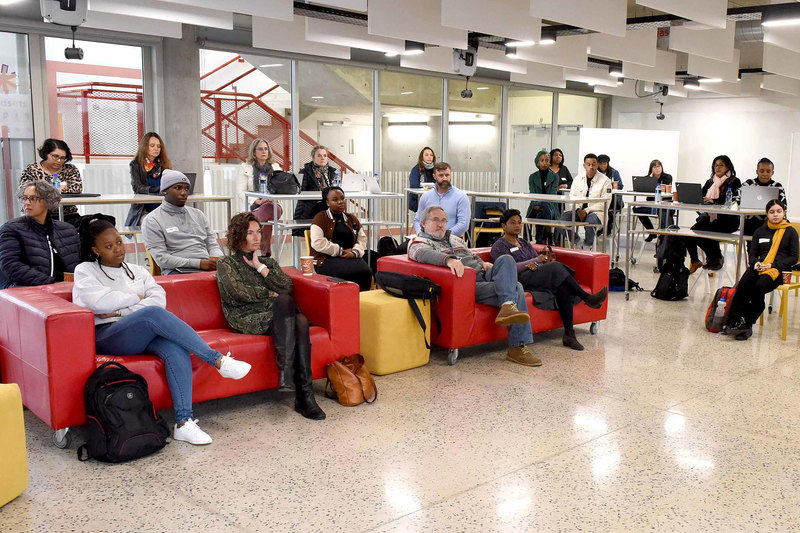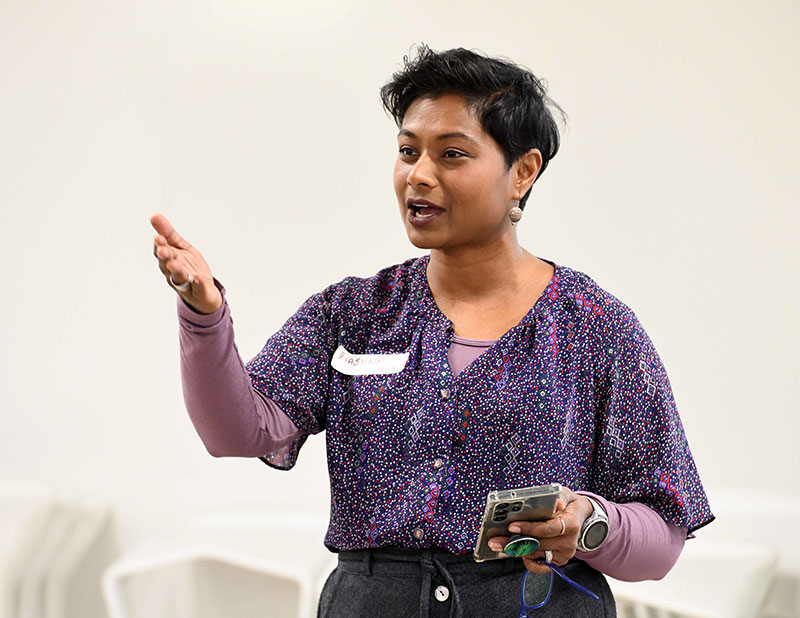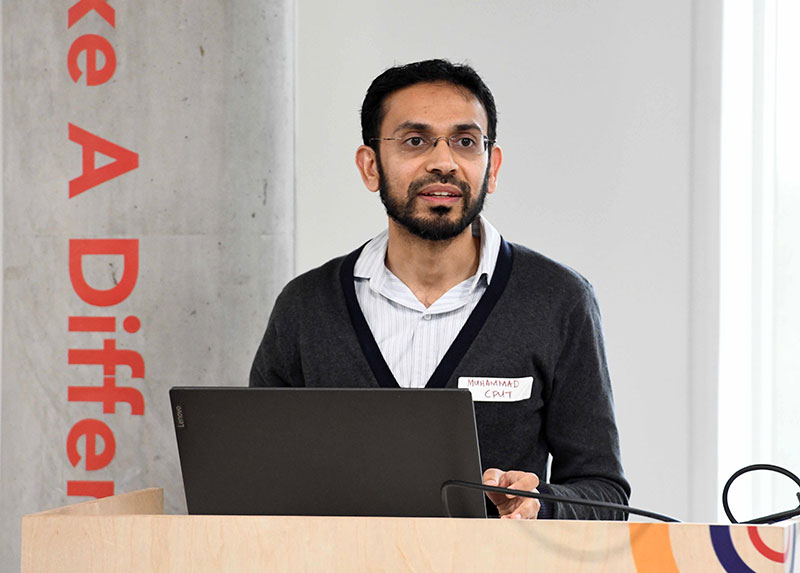Western Cape universities integrate for student success
29 August 2023 | Story Nicole Forrest. Photos Nasief Manie. Read time 8 min.
On Thursday, 24 August, the University of Cape Town (UCT) facilitated a workshop themed “Integration for Student Success” at the Hasso Plattner School of Design Thinking Afrika* (d-school) in its capacity as coordinator of the Siyaphumelela Western Cape Regional Network.
Founded in 2014, the Siyaphumelela (“we succeed”) initiative aims to amplify postsecondary student success at institutions across South Africa. It focuses on using data analytics to better understand the reasons why students may or may not be succeeding to enable institutions to ideate effective interventions to encourage success.
Through improving institutional capacity to collect and use student data, Siyaphumelela hopes to create a more student-centred culture in the higher education sector to improve completion rates while reducing inequality. In addition to this, it seeks to expand evidence-based student success efforts using a scalable, networked approach.
The Western Cape regional network, which comprises UCT, the University of the Western Cape (UWC) and the Cape Peninsula University of Technology (CPUT), was established in 2021 to better address student success in a more localised manner.

“Siyaphumelela is a national collaboration that’s intended to create a community of institutions that can engage with issues of student success. We know that this is a national problem; our graduation rates are low; our achievement gaps are concerning. So, Siyaphumelela is a national network that’s set up for collaboration across these institutions,” explained Dr Riashna Sithaldeen, the deputy director of Academic Development at the Centre for Higher Education Development (CHED).
“One of the things that they’ve tried to do with the regional networks is develop more localised models of the initiative. The idea here is that having people who are geographically more closely related may help them to engage more deeply around issues because they operate within similar contexts.
“UCT is the lead facilitator in the Western Cape, but we try to think of this as a very flat structure. We share the space with UWC and CPUT with the aim of really engaging meaningfully with some of the challenges we face in enabling student success.”
Paving the path to success
The workshop built on the work from previous events, which focused on defining student success, understanding the factors that affect this success, identifying metrics for measuring success and pinpointing strategies to support students along their academic journey to success.
It kicked off with a brainstorming session around what is meant by “integration”. This was followed by breakaway sessions in which staff and students were encouraged to think about integration strategies at their institutions that work, those that may benefit from change, as well as questions, ideas and principles that can be used to drive that change.
“We really wanted to unpack integration as a concept – where we can do it; what enables it; what challenges it.”
“Today’s session was to think about how we can work better together. When we work, we don’t necessarily work together. And when we do, we often don’t do it very efficiently. What that means is that we end up wasting a lot of resources and human capital.
“We believe that there are better ways to work together – with other institutions and with students – because we’re all trying to achieve the same thing. That’s what the concept of integration embodies. So, for today’s workshop, we really wanted to unpack integration as a concept – where we can do it; what enables it; what challenges it,” noted Dr Sithaldeen.
Constructive collaboration
For those in attendance, the collaborative and integrative nature of the event was a major benefit. Rather than simply inviting academics into the space to ruminate on the challenges faced by the students in achieving success, the workshop included students from UCT, UWC and CPUT.
“There’s a big misunderstanding or gap between the needs of the students, the needs of the university and what the university thinks that the students need,” said Maphole Loke, a doctoral candidate in CPUT’s Faculty of Engineering & the Built Environment.
“The standards that we are working with are also inflexible and they aren’t practical for helping ama-2000, as we say, because they have very different needs to the students that these policies were made for.
“So, workshops like these are good for getting the ears of people who can make a difference, for them to hear our needs and so that we can listen to each other to find a solution that can work for everyone,” she added.
Dr Xena Cupido, the director of the Fundani Centre for Higher Education Development at CPUT, noted that the value of this collaboration cannot be understated. “We are able to get fresh perspectives and factor in context, which is great because the contexts are very different for the four universities in our region.
“I think the added perspective of having students on board is that we are also thinking together, thinking with and co-creating what we want to do and how we can move forward with students. So, it’s not the universities making the decisions on their own – it becomes a collaboration.
“Once we start doing that in other areas, we will learn how to effectively bring students on board with the university as a partner. Even though students are transient, they move through the system. When partnering with them becomes standard practice in what we do and how we do it, it becomes a habit and it becomes easier.”
Space for open dialogue
For delegates from Stellenbosch University (SU), which was engaging with the Siyaphumelela network for the first time through this event, the inclusion of the student voice was a definite highlight.
“The student voice was the greatest unexpected value that we drew from today’s session. Generally, at least at our institution, we try to involve students, but the structures in which they’re involved are often quite rigid. So there’s a limit to the kind of contributions they can make,” said Gert Young, senior advisor for higher education at SU’s Centre for Teaching and Learning.
“The freedom that the students had today to share their thoughts and ideas was quite illuminating and definitely brings a huge benefit.”
According to Associate Professor Muhammad Nakhooda from CPUT, the creation of a space that enables the sharing of knowledge and perspectives allows for richer discussion around the issues being faced by tertiary institutions.

“The biggest value here is the openness in creating a space for people to share their own perspectives and for us to be able to understand or stand in the position of other institutions. By working across institutions, we can see what students and academics from UCT, UWC or Stellenbosch are experiencing, what their positions are and what their perspectives are,” he said.
“For me, it’s important that we understand those perspectives, because it can help us to iron out any biases that we may have. So having this open space where we can all come together and share ideas is far more enriching than simply introspecting in our own spaces.”
 This work is licensed under a Creative Commons Attribution-NoDerivatives 4.0 International License.
This work is licensed under a Creative Commons Attribution-NoDerivatives 4.0 International License.
Please view the republishing articles page for more information.
















